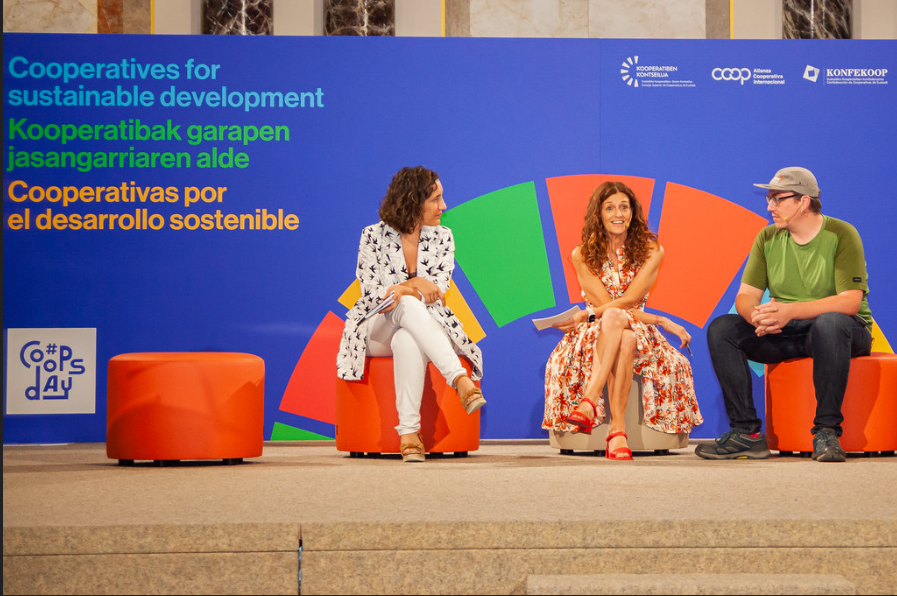
Sustainable Development is in our DNA: Cooperatives Globally Shows Evidence on #CoopsDay
On 1 July, the global cooperative movement came together to commemorate the 2023 International Day of Cooperatives, also called #CoopsDay. With the theme “Cooperatives for sustainable development,” this year’s celebration highlighted the profound impact of cooperatives in driving progress toward the Sustainable Development Goals (SDGs).

It was a big day for cooperatives worldwide that was celebrated in many different ways. All show the proudness of being part of a movement that puts people, the community, and the planet first to build a sustainable future. In our Coopsday map, you can explore many concrete examples from Egypt to Singapore, from Uruguay to Bulgaria, from Japan to the USA…Dive into the 2023 Coopsday edition at www.coopsday.coop
The International Conference ‘Cooperatives for Sustainable Development’ convened, drawing together cooperators from all around the world, both in Donostia and online, to explore the intricate relationship between the cooperative movement and each of the 17 SDGs.

The event, jointly organized by the Higher Council of Cooperatives of the Basque Country, Konfekoop, and COCETA in collaboration with the International Cooperative Alliance, commenced with opening remarks from local authorities in the Basque Country together with the ICA President, Ariel Guarco and the Chief of Branch of the Division for Inclusive Social Development of UNDESA, Wenyan Yang, setting the stage for an engaging program that featured six insightful round table debates. During these discussions, cooperative members from various countries shared their experiences and strategies on how their cooperatives contribute to the achievement of each of the 17 SDGs. The videos of the event will be available soon.
Summaries from each of these round tables can be found below.
ROUND TABLE 1: For people’s well-being

Round table 1, dedicated to people, addressed the important role of cooperatives in addressing poverty, hunger, health and well-being, clean water and sanitation, peace, justice, and strong institutions. The discussion explored how cooperatives mobilize self-help mechanisms, create opportunities, extend protection, and facilitate empowerment, all of which are essential for poverty reduction strategies. Speakers and video testimonies from Argentina, Ukraine and Spain discussed various initiatives in their cooperatives which focus on poverty reduction, sustainable waste management, dissemination of the cooperative spirit and training, and promotion of healthy food choices through consumer cooperatives. The invaluable contributions of cooperatives in achieving universal health coverage, fostering financial inclusion, and cultivating a culture of peace were widely acknowledged in this table moderated by the President of the International Health Cooperative Organisation (IHCO), Carlos Zarco.
ROUND TABLE 2: For a fairer world
Round table 2 highlighted how cooperatives empower people by providing economic opportunities, promoting inclusion and sustainability, and generating long-term jobs and prosperity. Testimonies from cooperatives in the Dominican Republic, India, and other countries showcased the positive impact of cooperatives in empowering women, reducing inequality, and supporting communities, especially during times of crisis like the COVID-19 pandemic.
“The Self-Employed Women’s Association (SEWA) is a National Trade Union of 2.1 million women in the informal economy. Very early on, 50 years ago, our founder late Ela ben Bhatt realized the power of cooperatives…We have no doubt over the last fifty years journey of SEWA and the SEWA Cooperative Federation, that cooperatives are the way for economic empowerment and self-reliance of the poorest of women in India and their families…So whether it’s education, closing the gender gap, the livelihood gap, closing the inequalities (both gender inequality and also income inequality), we are convinced in SEWA and the SEWA Cooperative Federation that the cooperatives are the way forward.” -Mirai Chatterjee, President of SEWA Cooperative Federation, India.

Speakers also highlighted cooperative collaboration and its impact on value chains, emphasizing the intangible benefits and values that cooperatives bring, such as fair income distribution and community well-being. Examples were given of cooperatives creating value through fair trade chains and multi-stakeholder cooperatives. The chair of the ICA Gender Equality Committee Xiomara Céspedes reminded participants how women have been able to make decisions in cooperatives and have leadership before being able to vote in many countries. Speakers recognized cooperatives as catalysts for change and the importance of education, decent work, and gender equality as foundational pillars for building a better society and fairer world for all. The round table was moderated by Iñigo Albizuri, President of CICOPA, the International organization for cooperatives in industry and services.
ROUND TABLE 3: For the well-being of communities

Round table 3 highlighted the importance of cooperatives in addressing community needs and promoting sustainable value for stakeholders. Speakers discussed topics such as renewable energy, energy efficiency, community involvement, and the role of cooperatives in improving the well-being of communities. Examples from Finland’s consumer cooperatives, U.S.’ electric cooperatives, and other countries were shared, including the efforts of Goiener S.Coop to generate and market renewable energy, and MONDRAGON Corporation’s focus on education, innovation, and infrastructure for community development. The round table was moderated by Rosa Lavin, President of Konfekoop, the apex for cooperatives in the Basque Country.
ROUND TABLE 4: For the well-being of the planet
Round table 4 focused on the importance of cooperatives in promoting sustainable development and their commitment to prioritizing the well-being of people and the planet. Speakers highlighted the need to address climate change and emphasized the urgency of taking measures to mitigate global warming. Speakers also showcased examples of cooperatives working towards sustainability, such as solar projects in Zimbabwe and sustainable fishing in the Republic of Fiji.
“We live in a coastal community where our people are heavily reliant on our ocean and our land resources. The climate threats that impacted our community, we see it every day. There are increasingly destructive storms as oceans become warmer and the weather patterns become more severe. Climate change affects our community’s health, our ability to grow food, our housing, our safety and work.” -Alisi Lutu, Chairperson, Bia I Cake Womens Co-operative Limited, Republic of Fiji.

In the areas of agriculture and food production, the round table identified priorities such as increasing the number of agricultural cooperatives, securing more funding for mitigation and adaptation efforts, implementing risk management programs, and promoting the recognition of cooperatives as climate change activists. The speakers emphasized the importance of values, education, technology, communication, and motivation in achieving sustainability while remaining competitive. The round table was moderated by Malena Riudavets, manager of the cooperatives of the Balearic Islands UCTAIB.
ROUND TABLE 5: More cooperators for a better world
Round table 5 focused on the importance of cooperation and public-private partnerships in achieving the SDGs outlined in the 2030 agenda. Speakers stressed the need to develop narratives based on cooperation and inter-cooperation to bring together diverse stakeholders and create a transformative agenda. The importance of education and partnerships between cooperatives and the educational world was also highlighted as a crucial element for the future of the cooperative movement and the social economy. The round table was moderated by Patxi Olabarria, President of the Higher Council of Cooperatives in Basque Country.

ROUND TABLE 6: Young cooperators for a better future
Roundtable 6 focused on the perspectives of younger generations in the cooperative movement and their belief in cooperatives as a solution for sustainable development. Speakers shared their experiences as part of the cooperative movement and emphasized the need to effectively communicate the benefits of cooperatives and their contribution to the social and economic landscape. The roundtable concluded with a call for increased participation and awareness among young people in shaping the future through cooperatives. The round table was moderated by Ana Agirre, ICA Youth Committee President.
“Young people today value equality, sustainability and active participation in decision making. Cooperatives offer the perfect setting for these values to develop and flourish. Cooperatives represent a reliable solution for the future. Cooperatives allow young people to be entrepreneurial, develop our skills, and generate a positive impact in our communities. Success in this model is measured not only in economic terms, which are clearly perceptible, but also in terms of social welfare and sustainable development.” -Elena Pérez Mordgado, Caja Popular Mexicana.

The discussions held during this event exemplify the crucial link between cooperatives and the achievement of the 17 SDGs demonstrating how sustainable development is rooted in cooperatives’ DNA. #CoopsDay has once again shown us that together, as a diverse and united movement, cooperatives reach extraordinary achievements through the power of cooperation. As partners for accelerated sustainable development, cooperatives will continue to drive change, build a better world, and inspire a future of inclusivity and resilience.
Take a look at the pictures from the event here.

